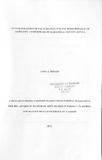| dc.description.abstract | Kenya relies heavily on the agricultural sector for economic growth, employment creation and foreign exchange generation. Agriculture accounts directly for 30% of the Gross Domestic Product (GDP), and a further 27% indirect contribution through linkages with manufacturing, distribution and other sectors. About eighty percent of Kenyans live in rural areas and depends directly on agriculture. However, only 18% of them use certified and improved agricultural farm inputs like seed and fertiliser and have adopted modem production practices and technologies. These rural farmers are often unable to access certified farm inputs, essential services, especially at the opportune time and place.
The key issues are often availability, unaffordable quantities or inappropriate qualities. Smallholders therefore often rely on less productive skills and technologies due to . inaccessible or lack of modem production knowledge and techniques. This condition is made worse by the often unfavourable input-produce price ratios. This ratio is negatively influenced by difficulties among key agro-processing industries in accessing critical inputs, and the resultant low quantities and qualities of produce.
Through questionnaire survey, direct observation, key informants and literature review, the current work studied the factors that influence performance of agro-input enterprises. Findings show that KASP played a decisive role in influencing performance of agro-input enterprises. The three KASP components (that is, building agro-dealers capacity to serve farmers, financial services for agro-dealers and farmers, and finally, advancing agricultural policy) that were implemented were successful.
Findings show that the demand-creation activities such as trainings, demonstrations and table banking among farmers groups, resulted in a more favourable business environment for the performance of the enterprises. KASP intervention increased awareness and knowledge among farmers on benefits of using certified inputs, facilitated the creation and sustainability of agro-enterprises and therefore brought inputs and made them more accessible. KASP created linkages among farmers and agro-dealers, and between them and input supply companies. This is an essential component of good business environment.
Findings of the current study have several implications, such as the following. One, the participation of agro-dealers in the implementation of projects right from the baseline is essential to enhance sustainability. Two, mechanisms for closer monitoring of similar projects are required, including after their closure as suggested by agro-dealers.
Agrodealers felt that project implementers pulled out suddenly, or without necessary backstopping. Three, there is need for keen consideration of equity and neediness during dispersing of grant equipment. Besides, more support needs to be focused on the Farmer Inputs and Savings Loan schemes (FISL) component to boost farmer-agro-dealer relationships. | en_US |

